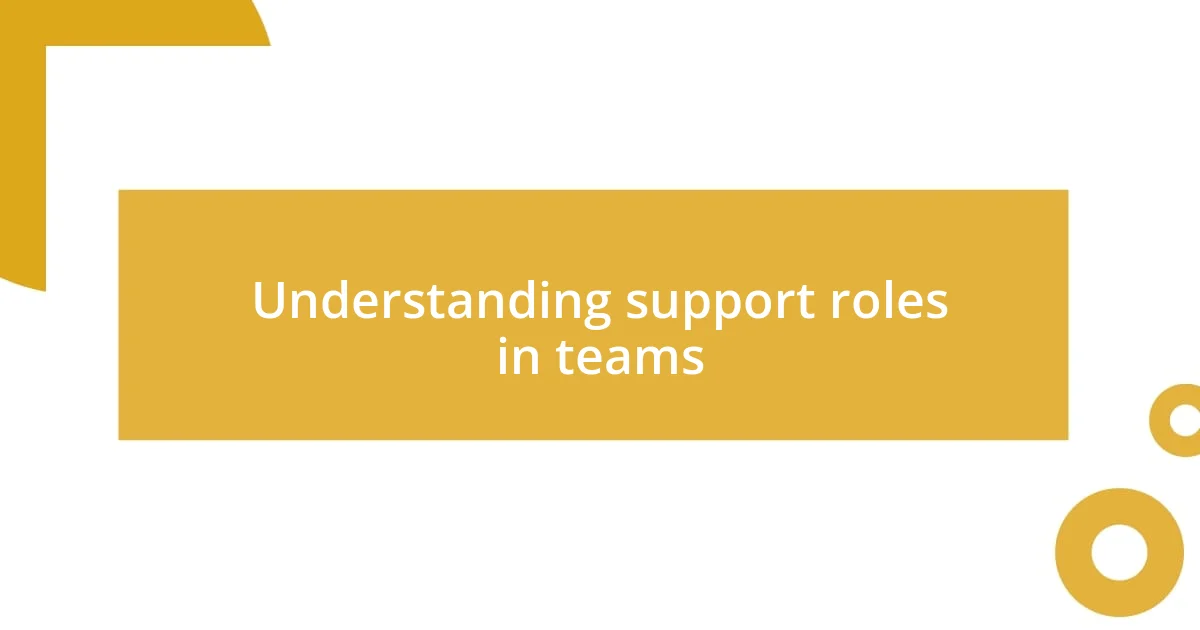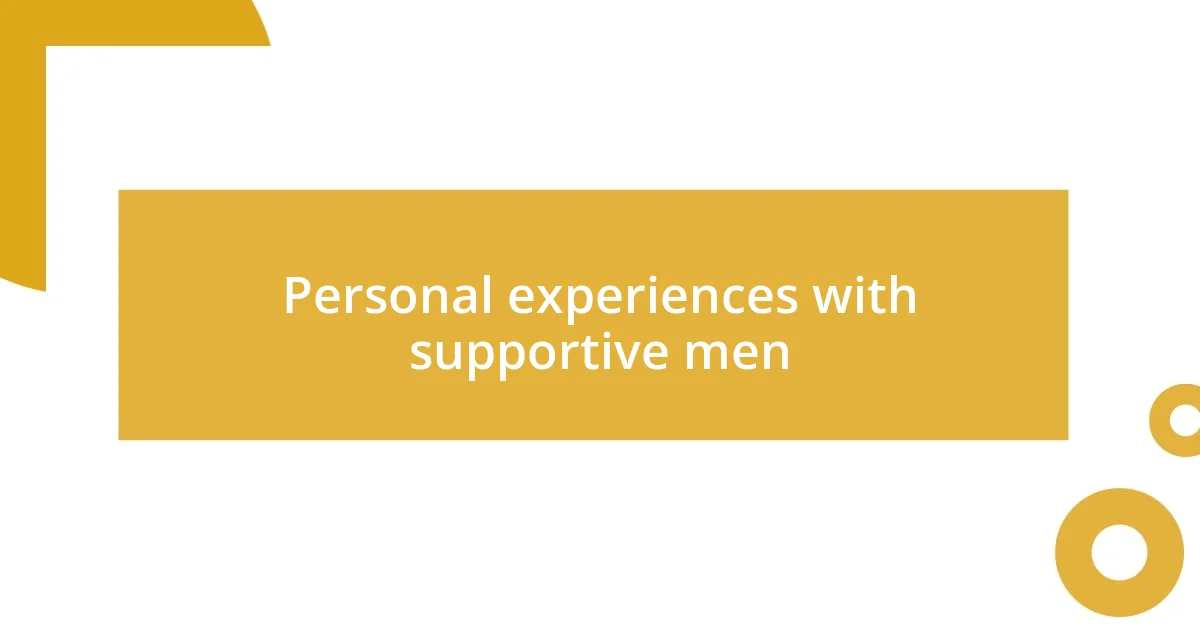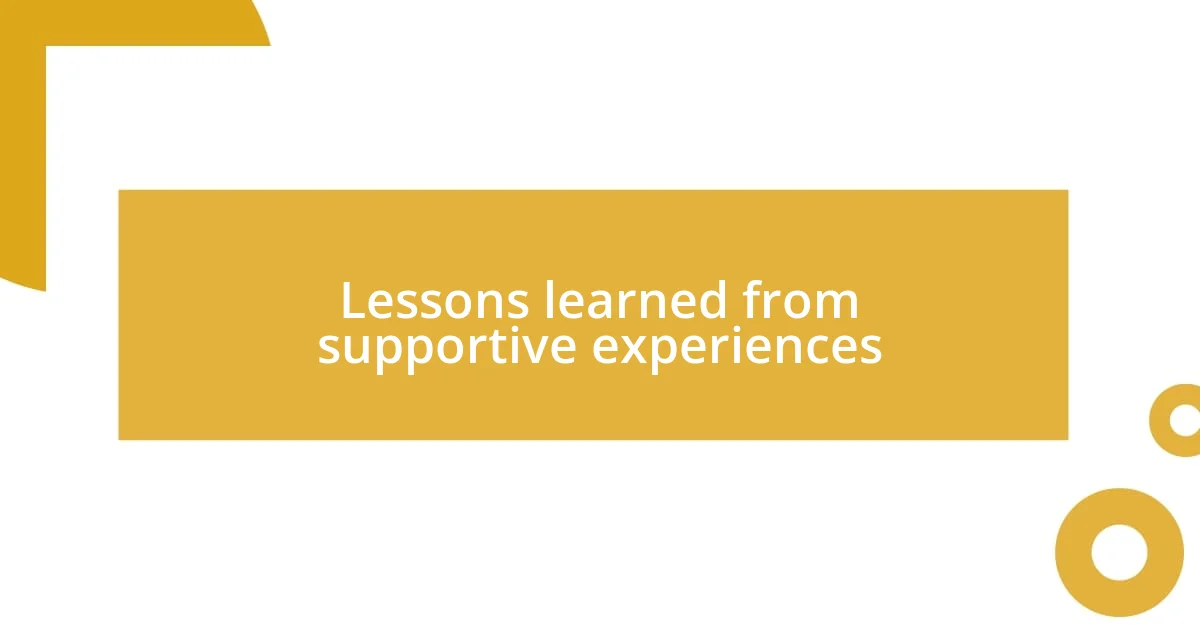Key takeaways:
- Support roles are essential for team morale and productivity, acting as unsung heroes that facilitate smooth operations.
- Challenges like burnout, poor communication, and lack of recognition can hinder the effectiveness of individuals in support roles.
- Building trust through authentic interactions, consistency, and vulnerability fosters stronger team dynamics and encourages openness.

Understanding support roles in teams
Support roles in teams often act as the glue that holds everything together. I remember working on a project where one of my colleagues, who took on a support role, always seemed to anticipate the team’s needs. It made me wonder: what would happen to a project if these roles were absent?
Having someone in a support position can dramatically influence morale and productivity. I once collaborated with a team where our support member constantly encouraged us during tough times, helping to lift our spirits. It struck me that their positivity was not just helpful; it was essential for our collective success.
Understanding the nuances of support roles is crucial. They may not always take the spotlight, but their contributions often make the success stories possible. Have you ever considered how often the behind-the-scenes efforts go unrecognized? Reflecting on my own experiences, I’ve realized that these roles are often the unsung heroes, quietly ensuring that everything runs smoothly.

Personal experiences with supportive men
Working alongside supportive men in various settings has highlighted the importance of their roles. One standout experience involved a mentor who provided guidance when I felt lost in my career. His calm reassurance and willingness to lend an ear boosted my confidence during uncertain times. I realized that having such a person not only helps professionally but also shapes one’s emotional landscape.
- A colleague once stayed late to help me meet a deadline, showcasing his commitment to team success.
- Another friend regularly checked in on my well-being, reminding me that teamwork goes beyond tasks.
- During a challenging project, a supportive male leader encouraged expression of ideas, creating a safe space for all team members.
These interactions undoubtedly foster a sense of belonging that keeps spirits high, proving that supportive men play a critical role beyond their assigned tasks.

Challenges faced in support roles
Support roles come with unique challenges that often go unnoticed. I recall a time when I was part of a team where the support person felt overwhelmed with expectations. They were expected to always provide solutions, which added pressure and sometimes led to burnout. It’s a reminder that while their role is crucial, the demand placed upon them can become excessive.
In my experience, communication is another significant hurdle. I once worked on a project where the support individual struggled to voice their needs and concerns. This led to misunderstandings and delays that could have been easily avoided. It made me realize how vital it is for people in support roles to feel empowered to speak up and share their insights.
Lastly, I’ve seen the impact of recognition—or the lack thereof. There was a situation where a colleague dedicated countless hours to ensure the team’s success, yet their efforts went largely unacknowledged. I believe that when contributions are overlooked, it can lead to feelings of insignificance. Recognizing the hard work of those in support roles is essential to keep their spirits high and motivation intact.
| Challenges | Examples |
|---|---|
| Burnout | Overwhelmed with expectations, leading to stress. |
| Poor Communication | Struggles in sharing needs results in misunderstandings. |
| Lack of Recognition | Efforts go unnoticed, causing feelings of insignificance. |

Effective communication strategies
Effective communication is the cornerstone of any successful support role. I remember a time when I was leading a project, and one of my male colleagues had a unique way of expressing his concerns without directly confronting anyone. His approach opened up dialogues that fostered understanding and collaboration. Reflecting on that experience, I realized that adopting a gentle yet assertive communication style can be transformative.
Another strategy that often goes overlooked involves active listening. I once had a mentor who practiced this skill impeccably. During our discussions, he would nod, maintain eye contact, and summarize what I said before responding. This showed me that when men actively listen, it not only enhances trust but also encourages others to share their thoughts freely. Have you ever experienced the difference it makes when someone truly pays attention?
Creating an environment where feedback is welcome is also essential. I think back to a team meeting where a supportive male team member initiated a pink post-it note feedback session. This casual approach relaxed everyone and led to surprisingly candid responses. It made me realize how such simple practices can lead to meaningful conversations and strengthen team dynamics. Recognizing that communication styles can vary greatly, I find it crucial for teams to tailor their strategies, ensuring that everyone feels seen and heard.

Building trust and rapport
Building trust and rapport hinges on authentic interactions. I remember a colleague who would often take a moment to catch up personally before diving into work discussions. Those small gestures made me feel valued, which, in return, encouraged me to be open and supportive. Have you ever noticed how such simple connections can pave the way for deeper trust?
In my experience, consistency plays a crucial role. There was one team member who always followed through on his commitments, no matter how small. His reliability inspired me and others to feel secure in our collaborations, knowing we could count on him. It left me wondering—how much does our dependability influence others’ perceptions of us in team settings?
I also believe that vulnerability can foster profound connections. I recall a time when a male colleague shared a personal struggle during a team meeting. It took courage, but it opened up a wave of honesty among us. That moment truly transformed our dynamic, creating an atmosphere where everyone felt safe sharing their thoughts. Isn’t it fascinating how shared experiences can bring people closer together?

Lessons learned from supportive experiences
Reflecting on my supportive experiences with men, I’ve learned that patience truly makes a difference. I once had a male coworker who took the time to help me understand a complicated software tool. Instead of rushing through explanations, he patiently walked me through each step, checking in regularly to see if I had questions. That simple act of kindness not only boosted my skills but also highlighted the power of being patient in a support role. Isn’t it amazing how a little time can foster growth and confidence in others?
Another key lesson revolves around the importance of encouragement. I remember during a challenging project when a male colleague consistently acknowledged my contributions, even the small ones. His words of appreciation created a positive environment that motivated me to push through hurdles. It made me think—how often do we truly recognize the efforts of those around us? I’ve come to realize that a few encouraging words can change the trajectory of someone’s day, or even their career.
Lastly, I’ve discovered that shared humor often acts as a bridge in supportive roles. There was a moment when a light-hearted joke made by a male friend during a stressful deadline almost felt like a collective sigh of relief. It reminded us all that while the stakes were high, we could still find joy in our teamwork. It leads me to ponder—don’t we all benefit from a little laughter, especially in tough situations? Embracing shared humor not only eases tension but also strengthens connections among team members.














